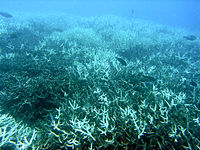
Endosymbiont-Mediated Adaptive Responses to Stress in Holobionts.
Sign Up to like & getrecommendations! Published in 2020 at "Results and problems in cell differentiation"
DOI: 10.1007/978-3-030-51849-3_21
Abstract: Endosymbiosis is found in all types of ecosystems and it can be sensitive to environmental changes due to the intimate interaction between the endosymbiont and the host. Indeed, global climate change disturbs the local ambient… read more here.
Keywords: responses stress; adaptive responses; endosymbiont mediated; stress tolerance ... See more keywords

Transcriptome analysis providing novel insights for Cd-resistant tall fescue responses to Cd stress.
Sign Up to like & getrecommendations! Published in 2018 at "Ecotoxicology and environmental safety"
DOI: 10.1016/j.ecoenv.2018.05.066
Abstract: Cadmium (Cd) is a severely toxic heavy metal and environmental pollutant. Tall fescue is a cold season turf grass which has high resistance to Cd as well as the ability to enrich it. To investigate… read more here.
Keywords: responses stress; fescue; fescue responses; novel insights ... See more keywords

Reactive oxygen and nitrogen species as key indicators of plant responses to Cd stress
Sign Up to like & getrecommendations! Published in 2019 at "Environmental and Experimental Botany"
DOI: 10.1016/j.envexpbot.2018.10.012
Abstract: Abstract Although cadmium (Cd), an extremely toxic non-essential heavy metal, has no biological function, it is capable of entering plant roots. Cd not only presents a problem for plants, which have developed specific Cd detection,… read more here.
Keywords: plant responses; plant; reactive oxygen; nitrogen species ... See more keywords

Nestin Regulates Keap1-Nrf2-HO-1-Mediated Antioxidant Responses during Stress and Malignant Hematopoiesis
Sign Up to like & getrecommendations! Published in 2022 at "BioMed Research International"
DOI: 10.1155/2022/1706585
Abstract: Objective To investigate the role of nestin in regulating Keap1-nuclear factor erythroid-2-related factor 2 (Nrf2)-heme oxygenase-1-(HO-1-) mediated antioxidant responses in stress and malignant hematopoiesis. Methods The mRNA of peripheral blood mononuclear cells was extracted from… read more here.
Keywords: antioxidant responses; keap1 nrf2; stress malignant; mediated antioxidant ... See more keywords

Infrared Thermography Reveals Sex-Specific Responses to Stress in Mice
Sign Up to like & getrecommendations! Published in 2020 at "Frontiers in Behavioral Neuroscience"
DOI: 10.3389/fnbeh.2020.00079
Abstract: Psychogenic hyperthermia is a stress-related condition reported mostly in women. Neuroendocrine responses to stress in females differ from those in males, and these differences cannot be explained solely based on hypothalamic-pituitary-adrenal (HPA) axis activity. Here,… read more here.
Keywords: responses stress; stress mice; sex specific; deprivation ... See more keywords